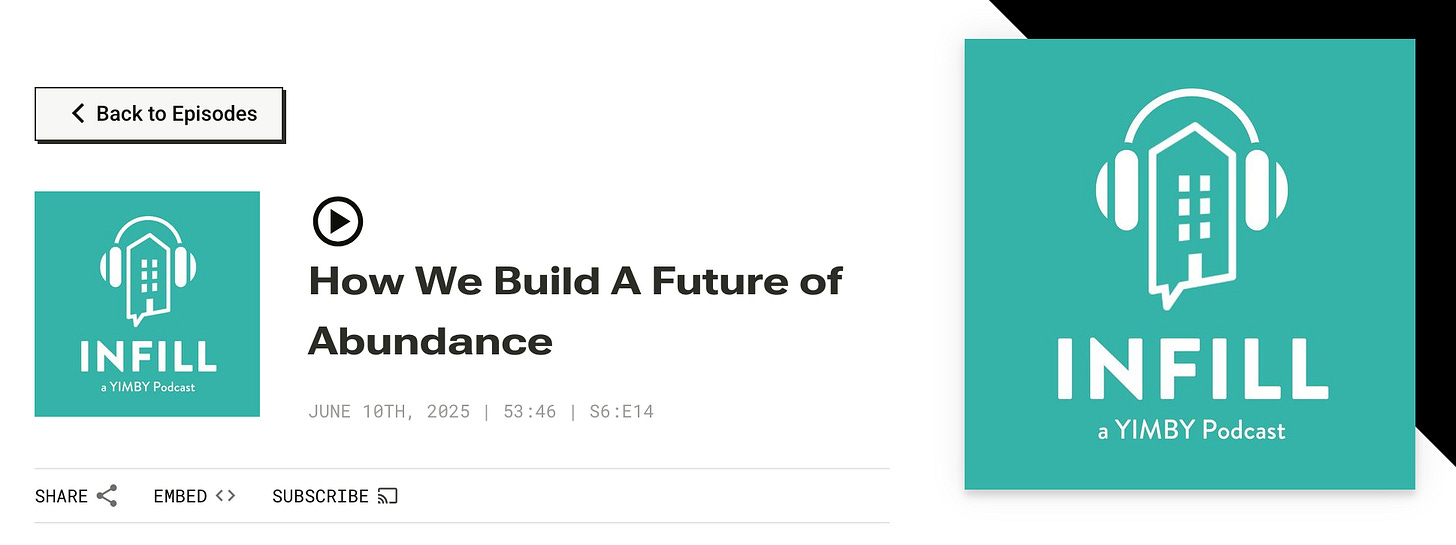Abundance Network x YIMBY Action Podcast
A great conversation on the relative efficiency of various strategies for buying votes
On the latest episode of the INFILL podcast, Gillian Pressman (YIMBY Action Managing Director), Sonja Trauss (YIMBY Law Executive Director), and Misha Chellam (Founder at the Abundance Network) talked about getting abundance policies enacted.

Enjoy my highlights and reactions!
Gillian spells out a challenge we often face with some potential donors — they want to change policy but are extremely nervous about politics.
Pressman: “I think the big challenge with philanthropy is that, when it comes to our work, they're very interested in systems change. [...] But they are afraid of politics, so they want to do systems change without politics.
“Why does local organizing need to be part of the solution? Why, for example, can't we just maybe write a lot of white papers? Why can't we just do direct lobbying? Why can't it just be sending a, you know, a really smart guy in a room to meet with legislators and tell them what's what, why do we need the local organizing component?”
Chellam: “We are trying to change big human systems […] Sending the lobbyist in to win the arguments on the merits is important […] but the legislator also needs to validate it in the background algorithm they're running in their heads. Like, are there actually people in my community that feel this way? Or did this lobbyist show up and they're […] presenting this idea that sounds good, but it's not motivated or backed up by any real groundswell of people.”
I could not agree more. My favorite way to think about this is via the metaphor of a parade. Politicians love a parade and want nothing more than to march at the head of one. Our job is to build them the biggest parade we can.
The idea that politicians are running an algorithm when deciding where to stand on an issue comes up frequently in pop-culture about politicians, but frequently people over-simplify it to be “money in, corporate opinions out.” But Sonja said it’s more complex than that.
Trauss: “Something that I get really frustrated [about] with Bernie types or any of the folks that are really heavy on the [claim that] politicians are bought, is that you gotta stop and think, ‘what is that money buying?’ Presumably it's buying votes. [But] the end of everything is actually a person doing something. So whether it's volunteering for an elected, or showing up at a hearing, there always has to be an action.”
Sonja and I recognized this insight early: Money is important, but money is only one way to accumulate votes and generate value for politicians. When we grow a chapter and develop a power base, we’re creating constituency that believes in YIMBYism and can deliver resources (votes, volunteers, donations etc) for politicians. And that’s what politicians care about — where their votes are going to come from, and the resources they need to get them.
As I’ve said before, “politicians are a collection of interest groups in a trench coat.”
If you’re establishing your spot in that politician’s trench coat with straight up cash, it’s less effective than creating a stable, visible voting bloc. You can buy your way into the trench coat, but it’s not the most effective option (ask Andrew Cuomo backers for details). If you can establish that people will consistently vote for politicians who make progress on your issue, that’s way more sticky and ultimately less expensive than continuously spraying money in elections.1
There’s lots more good stuff in the episode. Gillian, Sonja, and Misha get into the tensions between single issue groups like YIMBY Action and multi-issue groups like Abundance Network; advocacy; fundraising strategy; and what makes Scott Wiener, Scott Wiener.
Because you don’t actually buy politicians, you can only rent them. More on this later.


Great podcast Laura!